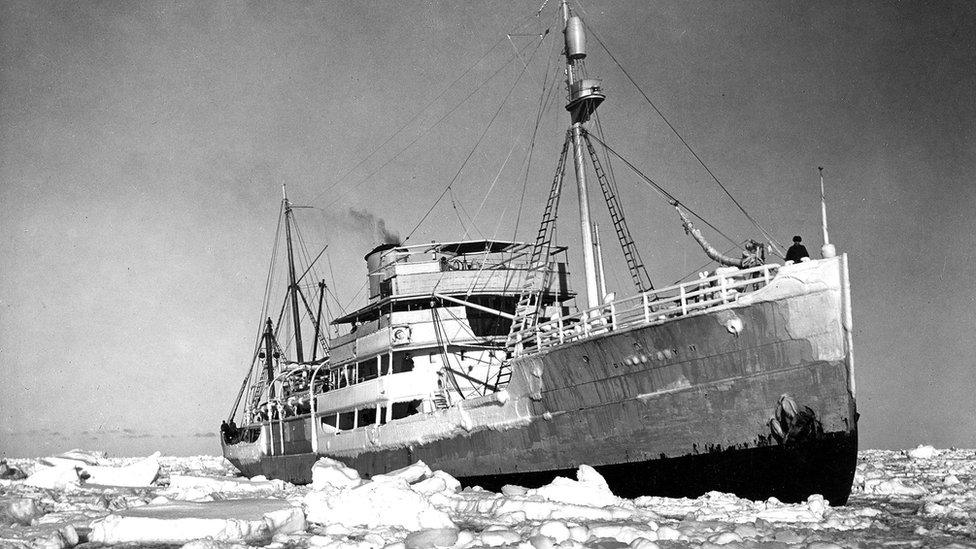Long-delayed Ferguson ferry Glen Sannox begins sea trials
- Published
Long-delayed Ferguson ferry Glen Sannox begins sea trials
A CalMac ferry being built at Ferguson shipyard on the Clyde has sailed under its own power for the first time, eight years after construction began.
MV Glen Sannox made a short journey downriver as it begins sea trials ahead of delivery this summer.
The ship and its sister vessel Glen Rosa were due to be finished in 2018, but the project has been plagued by design and construction issues.
Ferguson Marine said the start of sea trials was a significant milestone.
The ship was tethered to a tug for safety as it left the quayside at the Port Glasgow shipyard where it has been moored since it was launched by then first minister Nicola Sturgeon in 2017.
But for the first time it was powered by its own engines, running on diesel. The dual-fuel ship, the first of its type to be built in the UK, will eventually be capable of also running on liquefied natural gas once the gas systems are commissioned.
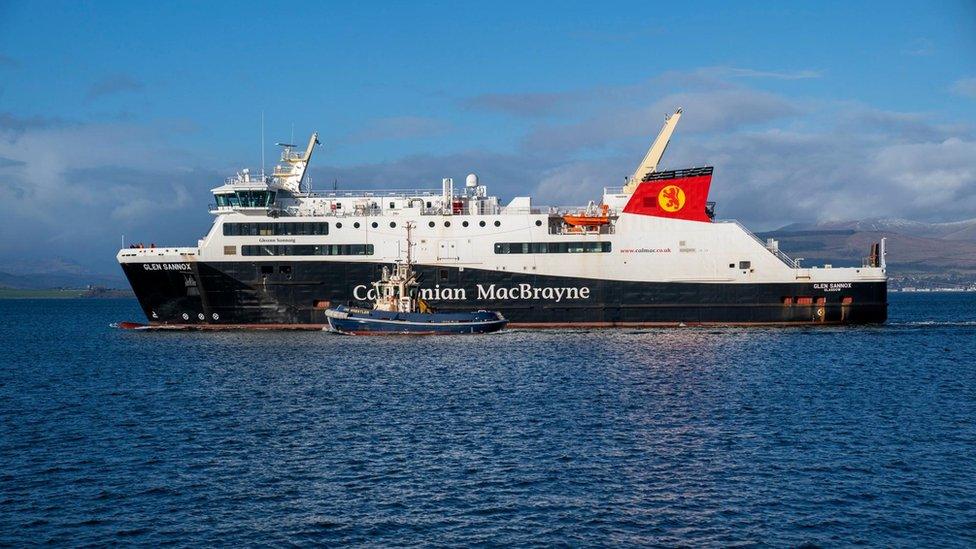
Glen Sannox finally sailed from the quayside under its own power eight years after construction began
Ferguson Marine chief executive David Tydeman said: "Today Glen Sannox confidently left the quayside under her own propulsion for the first time
"She sounded her horn and began the first in a series of rigorous sea trials. We began with the anchor and moved onto propulsion and manoeuvring tests. This will continue for the rest of the week.
"I would like to thank my colleagues at the shipyard and the team at CMAL for their hard work in achieving this key milestone."
During initial sea trials over the next few days Glen Sannox is expected to travel as far as Gourock. Higher speed and "endurance" testing is planned after the ship goes into dry dock in April.
Once handed over, ferry operator CalMac will then conduct its own sea trials before the ship finally enters service on the busy Arran route.

Former First Minister Nicola Sturgeon announced the award of the ferries contract to Ferguson Marine in August 2015
The contract for the two ferries was awarded to the shipyard in 2015, just a year after it had been rescued from administration by Clyde Blowers, an investment firm led by businessman Jim McColl.
Construction began the following year but soon ran into trouble as the yard struggled to meet the demanding specification for the ships.
Mr McColl subsequently blamed government-owned ferries procurement agency Caledonian Maritime Assets Limited (CMAL) for putting a flawed concept design out to tender, and for demanding repeated design changes which led to spiralling costs and delays.
CMAL has rejected the criticism, claiming the problems arose because of "catastrophic" contractor failure in what was a "design and build" contract.
The bitter dispute eventually saw the shipyard fall back into administration in 2019 and it was subsequently nationalised.
Since then cost increases and delays have continued, with the final bill likely to be four times the original £97m contract price, and the ferries will be delivered at least six years late. David Tydeman recently described the design challenges as more complex than a Royal Navy warship.
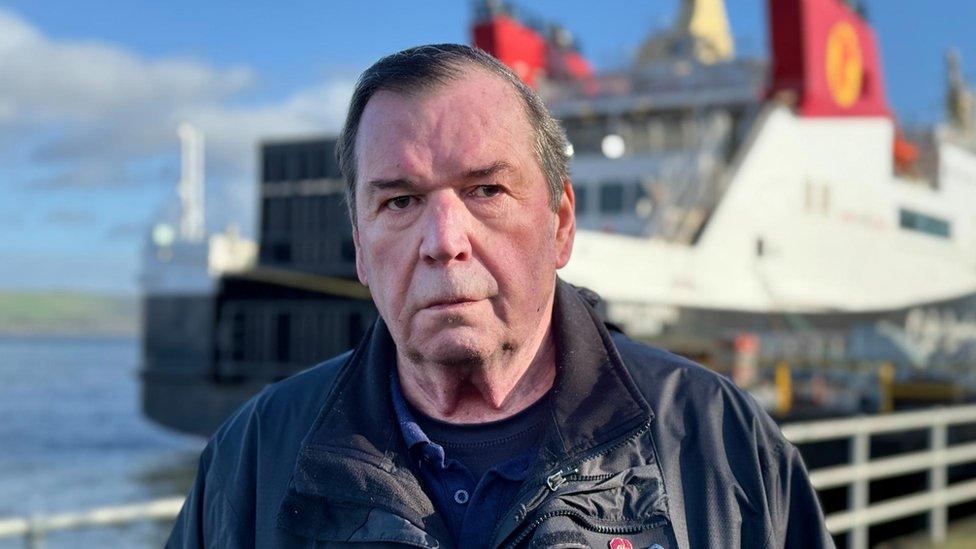
GMB organiser Gary Cook said the Ferguson workforce were not to blame for problems
Gary Cook, senior organiser for the GMB union which represents the Ferguson workforce, said the shipyard workers were not to blame for what had gone wrong with the ill-fated project.
The union is urging the Scottish government to secure the future of the shipyard by directly awarding a contract for seven smaller CalMac vessels, similar to ships the yard has previously delivered on time and on budget.
He told the BBC's Good Morning Scotland programme: "The skills of people in that shipyard is not in question - we are currently engaged in a contract with BAE Systems for packets of work on the Type 26 frigates programme for the Royal Navy - the very highest standards of shipbuilding demanded.
"If BAE Systems believe in the workforce at Ferguson's why would not the Scottish government?"
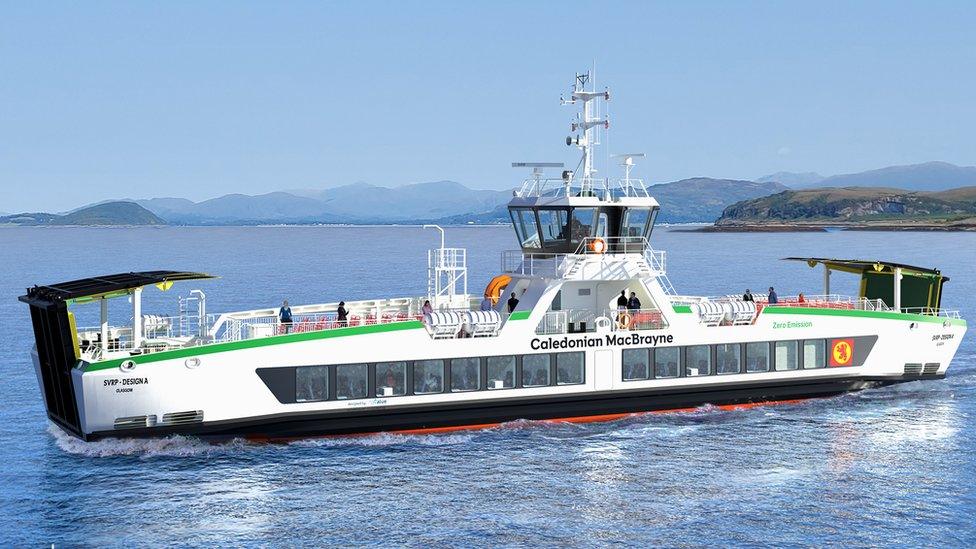
Ferguson Marine is hoping it will be asked to build a new fleet of all-electric small vessels for CalMac. Concept design image supplied by CMAL.
He said the yard was providing skilled work in one of Scotland's most deprived areas, including apprenticeships for a new generation of shipbuilders.
The Scottish government is still reviewing its options for the award of the small vessels contract, and has said it intends to return the shipyard to private ownership when "the time is right".
Mr Cook said it was too soon to consider privatising the yard as it needed more investment to make it competitive.
He said the right time would be when "we are making ships, we have a full order book, we are making profits and we've gone some way to paying back some of the money that's been invested".
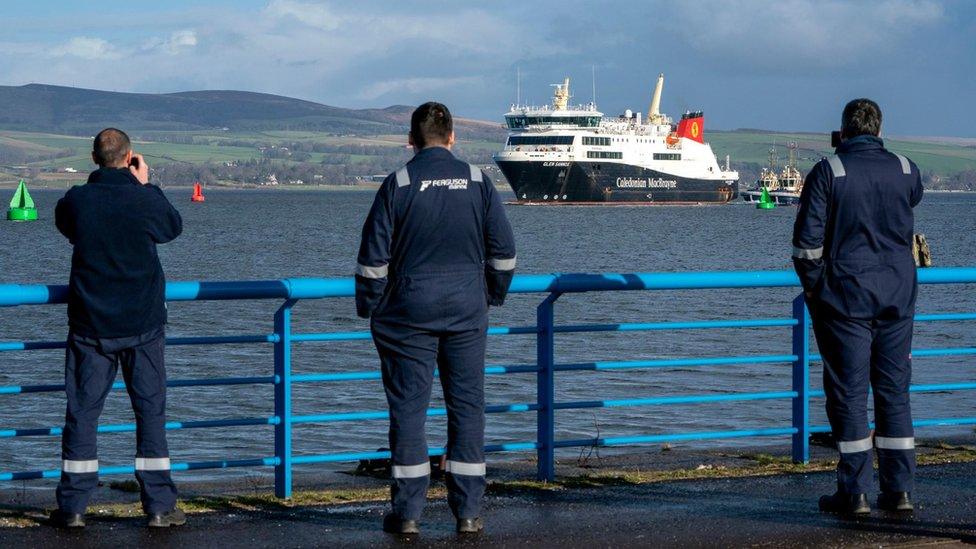
Ferguson Marine is doing subcontracting work on Navy warships but has no new ship orders at present
The second CalMac ship being built at Ferguson Marine, MV Glen Rosa, is due to be launched in April but will require many months of further fitting out on the quayside before it is delivered next year.
Four other CalMac vessels which have a less complex propulsion system and lower cargo carrying requirements, are currently under construction at a shipyard in Turkey.
The first of them, MV Isle of Islay, is due to be launched next month and is expected to be delivered later this year.
Related topics
- Published26 November 2023
